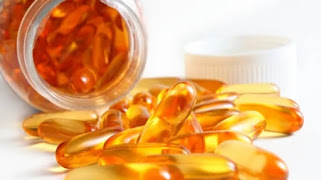Which supplement is best for glowing skin?
Achieving glowing skin often involves a holistic approach that combines a balanced diet, proper skincare, hydration, and a healthy lifestyle. While there is no single supplement that can magically transform your skin overnight, certain vitamins, minerals, and supplements can complement your skincare routine and promote a healthy, radiant complexion. In this article, we'll explore some of the best supplements for glowing skin and how they work.
1. Collagen Supplements:
Collagen is a protein that provides structural support to
the skin, helping it maintain elasticity and firmness. As we age, collagen
production decreases, leading to sagging skin and wrinkles. Collagen
supplements, typically derived from animal sources, can help replenish collagen
levels in the skin.
How it works: Collagen supplements are broken down in the
digestive system into amino acids, which are then used by the body to produce
collagen. This can lead to improved skin hydration, elasticity, and reduced
signs of aging.
2. Vitamin C:
Vitamin C is a potent antioxidant that plays a crucial role
in collagen synthesis. It also helps protect the skin from oxidative damage
caused by UV radiation and pollutants.
How it works: Vitamin C boosts collagen production, promotes
even skin tone, and reduces the appearance of dark spots and wrinkles. It also
assists in the repair of damaged skin cells.
3. Vitamin E:
Vitamin E is another antioxidant that helps protect the skin
from free radicals and UV damage. It also aids in moisturizing the skin and
promoting healing.
How it works: Vitamin E neutralizes free radicals that can
cause premature aging and supports the skin's natural moisture barrier,
preventing dryness and flakiness.
4. Vitamin A (Retinol):
Vitamin A, specifically in the form of retinol, is known for
its skin-regenerating properties. It helps stimulate collagen production,
reduces fine lines and wrinkles, and improves skin texture.
How it works: Retinol increases cell turnover, which means
it encourages the shedding of old skin cells and the growth of new ones. This
process can result in smoother and more youthful-looking skin.
5. Omega-3 Fatty Acids:
Omega-3 fatty acids, found in fish oil supplements or
through dietary sources like fatty fish, walnuts, and flaxseeds, help maintain
the skin's lipid barrier, keeping it hydrated and plump.
How it works: Omega-3s reduce inflammation, which can lead
to redness and acne. They also help maintain the skin's elasticity and
hydration, contributing to a smoother complexion.
6. Zinc:
Zinc is a mineral that plays a role in skin health by
regulating oil production, reducing inflammation, and supporting the skin's
natural healing processes.
How it works: Zinc can help control acne and promote wound
healing. It also assists in maintaining balanced hormone levels, which can
impact the skin's condition.
7. Biotin (Vitamin B7):
Biotin is a B-vitamin that contributes to healthy skin,
hair, and nails. While biotin deficiency is rare, some people choose to
supplement to support their skin health.
How it works: Biotin helps in the production of fatty acids,
which are essential for maintaining healthy skin cells. It may contribute to a
more youthful and radiant complexion.
8. Probiotics:
Probiotics are beneficial bacteria that support gut health,
which is linked to skin health. An imbalanced gut microbiome can lead to
inflammation and skin conditions like acne and eczema.
How it works: Probiotics help balance the gut microbiome,
which can reduce inflammation and improve skin conditions by promoting a
healthy immune response.
9. Selenium:
Selenium is a mineral with antioxidant properties that can
help protect the skin from damage caused by free radicals and UV radiation.
How it works: Selenium supports the body's natural
antioxidant defenses, reducing oxidative stress and supporting skin health.
Supplement Considerations and Precautions:
While supplements can be beneficial for skin health, it's
essential to approach them with caution:
Consult a Healthcare Professional: Before starting any new
supplement regimen, consult with a healthcare provider or dermatologist to
ensure that it's suitable for your specific needs and health status.
Balance and Variety: A well-balanced diet rich in vitamins,
minerals, and antioxidants is the foundation of healthy skin. Supplements
should complement a healthy diet, not replace it.
Quality Matters: Choose reputable brands and high-quality
supplements to ensure safety and efficacy. Look for third-party testing and
certifications.
Dosage: Follow the recommended dosage on the supplement
label or as advised by a healthcare professional. Excessive intake of certain
vitamins and minerals can have adverse effects.
Consistency: It may take several weeks or months to see
noticeable improvements in skin health with supplements. Be patient and
consistent with your regimen.
Allergies and Sensitivities: Be aware of any allergies or
sensitivities you may have to specific supplements or ingredients.
Interactions: Some supplements may interact with medications
you are taking. Always inform your healthcare provider of any supplements you
are using.
A Holistic Approach to Glowing Skin
While supplements can play a role in promoting glowing skin, they should be part of a broader approach to skincare and overall health. A healthy diet, proper hydration, a consistent skincare routine, sun protection, and a balanced lifestyle all contribute to vibrant and radiant skin. Before adding any supplements to your regimen, consult with a healthcare professional to determine which options are best suited to your individual needs and goals. Remember that maintaining healthy skin is a long-term commitment, and patience is key to achieving and maintaining a glowing complexion.

.webp)
